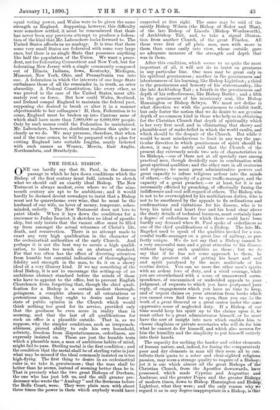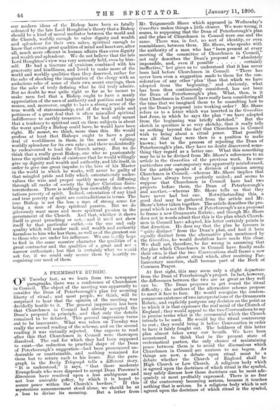THE IDEAL BISHOP.
ONE can hardly say that St. Paul, in the famous ' passage in which he lays down conditions which the Bishop of the first century must fail, intends to sketch what we should call an exactly ideal Bishop. The New Testment is always modest, even where we of the nine- teenth century are apt to be ambitious ; and it would. hardly be deemed decent nowadays to insist that a Bishop must not be quarrelsome over wine, that he must be the husband of one wife, no lover of money, temperate, sober- minded, orderly. The New Testament does not love to paint ideals. When it lays down the conditions for a successor to Judas Iscariot, it sketches no ideal of apostle- ship, but only insists that the vacant office must be filled up from amongst the actual witnesses of Christ's life, death, and resurrection. There is no attempt made to exact any very high qualification in the character of the ecclesiastical authorities of the early Church. And perhaps it is not the best way to secure a high qualifi- cation, to insist too much on an abstract standard. For that too often has the effect of diverting attention from humble but essential indications of thoroughgoing fidelity and strength in the man, to fix it on a showy ideal of a very illusory kind. If we say something of the ideal Bishop, it is not to encourage the setting-up of an ambitious abstract standard. before the minds of those who have to appoint to the office, but to prevent English Churchmen from forgetting that, though the chief quali- fication for a Bishop is a certain modest thorough- goingness, a complete absence of all ostentatious or pretentious aims, they ought to desire and foster a state of public opinion in the Church which would think nothing too good. for its service, provided only that the goodness be even more in. reality than in seeming, and that the last of all qualifications for such an office is a plausible outside. That is, as we suppose, why the simpler conditions, snch as irreproach- ableness, proved ability to rule his own household, sobriety, freedom from disputatiousness, orderliness, are expressly insisted on. These are just the humble tests which a plausible man, a man of ambitious habits of mind, might fail to pass. Sterling metal is the first condition ; and the condition that the metal shall be of sterling value is just what may be missed if the ideal commonly insisted. on is too high-flying. The first thing to desire in an ecclesiastical ruler is, we take it, genuineness ; that the man shall be better than he seems, instead of seeming better than he is. That is precisely what the two great Bishops of Durham, the one who has just left us, and the still greater pre- decessor who wrote the " Analogy " and the Sermons before the Rolls Court; were. They were plain men with about three times the power in them which anybody would have suspected at first sight. The same may be said of the saintly Bishop Wilson (the Bishop of Sodor and Man), of the late Bishop of Lincoln (Bishop Wordsworth), of Archbishop Tait, and, to take a signal illustra- tion from another Church, of the great F4nelon. All these were first of all plain men, men with more in them than came easily into view, whose outside gave no adequate measure of the strength and depth that was in them.
After this condition, which seems to us quite the most important of all, it will not do to insist on greatness in any particular line. One man may be great only in- his spiritual genuineness ; another in the genuineness and laboriousness of his learning, like Bishop Lightfoot ; a third in the genuineness and honesty of his statesmanship, like the late Archbishop Tait ; a fourth in the genuineness and depth of his reflectiveness, like Bishop Butler ; and a fifth in the genuineness of his missionary zeal, like Bishop Hannington or Bishop Selwyn. We must not define in what direction we wish the genuineness to exhibit itself, but only foster the notion that we do desire to see genuine depth of no common kind in those who help us in obtaining for the Christian Church that depth of spirituality which is her very first need, and in eliminating that showy and plausible sort of make-belief in which the world exults, and which should be the despair of the Church. But while, it would be most mischievous to limit in any way the par- ticular direction in which genuineness of spirit should be shown, it may be safely said that the Church of the present day extremely needs two sets of characteristics in its Bishops,—one of them not at all specially rare among- practical men, though decidedly rare in combination-with great spiritual qualities ; and the other rare in all centuries and regions ; we mean great administrative powers and great capacity to infuse religious ardour into the minds of others,—the capacity of a great traffic-manager, and the capacity of a great preacher,—or at least, for it is not necessarily effected by preaching, of effectually fusing the indifference and cool self-regard of others. The Bishop who is not to be overweighted by his multifarious duties, who is not to be smothered by the appeals to fix ordinations and confirmations and visitations for his diocese, who is to keep his mind and heart free and his head clear above the dusty details of technical business, must certainly have a degree of orderliness for which there could have been hardly any demand when St. Paul spoke of orderliness as one of the chief qualifications of a Bishop. The late Mr. Bagehot used to speak of the qualities needed for a sue- cessful traffic-manager on a great line of railway, as per- fectly unique. We do not say that a Bishop cannot be a very successful man and a great stimulus to his diocese without having such qualities as these ; but we do say that if he has not some approach to them, be runs the greatest risk of getting his heart and soul and spirit paralysed by the mere multitude of his routine duties. You can no more fire other men's spirits with an ardent love of duty, and a vivid courage, while you are overwhelmed with a sense of unanswered corre- • spondence, of unexamined or undecided appeals to your _ judgment, of requests to which you have postponed your reply, of engagements which you have no time to keep, and of urgent claims on your attention from books which you cannot even find. time to open, than you can do the work of a great General or a great orator under the same oppressive sense of neglected duty. If a Bishop of our time would keep his spirit up to the claims upon it, he must either be a great administrator himself, or he must have the sort of insight into men which enables him to choose chaplains or private secretaries who will do for him what he cannot do for himself, and which also secures for him the humility and the simplicity to put himself entirely into their hands.
The capacity for melting the harder and colder elements of human nature, and, indeed, for fusing the comparatively poor and dry elements in man till they seem all to con-. tribute their quota to a sober and clear-sighted religious passion, may seem a strange quality to require of a Bishop; yet it is one which almost all the great Bishops of the:. Christian Church, from the Apostles downwards, Irate possessed, which made Cyprian and Augustine an Ambrose, and the greater Popes and the greater I3isb9pa: of modern times, down to Bishop Hannington and Bishati:. Lightfoot, what they were ; and the only reason why, we regard it as in any degree inappropriate in a Bishop, is that our modern ideas of the Bishop have been so fatally coloured by the late Lord Houghton's theory that a Bishop should be a kind of moral mediator between the world and the Church, worldly enough to value dignity and wealth and splendour for their own sakes, spiritual enough to know that certain great qualities of mind and heart are, after all, much more efficient in human affairs than even dignity and wealth and splendour. We do not believe that the late Lord Houghton's view was very seriously held, even by him- self. He had a tincture of cynicism combined with his generosity and kindliness, and loved to make more of the world and worldly qualities than they deserved, rather for the sake of shocking the imagination of the clergy with an audacious echo of some of their own secret cravings, than for the sake of truly defining what he did truly admire. But no doubt he was quite right so far as he meant to make men feel that a Bishop ought to have a manly appreciation of the uses of authority and position and large means, and, moreover, ought to have a strong sense of the true worth of statesmanship, and of the weak pride and pettiness of a great deal that is often miscalled spiritual indifference to earthly treasures. If he had only meant that a tendency to spiritual cant on these subjects is about the worst quality a Bishop could have, he would have been right. He meant, we think, more than this. He would profess at least that Bishops ought to have a good deal of worldliness in them, in the sense of valuing worldly splendour for its own sake ; and there undoubtedly lie endeavoured to lead the Church astray. But we do -think that a really great Bishop, one who so passionately loves the spiritual ends of existence that he would willingly give up dignity and wealth and authority, and life itself, in order to give one great impulse to the love of his Master in the world in which he works, will never be guilty of that mingled pride and folly which ostentatiously under- values the wise and proper earthly means of diffusing through all ranks of society the higher Christian disin- terestedness. There is nothing less unworldly then osten- tatious poverty of spirit. Indeed, ostentation of any kind and true poverty of spirit are contradictions in terms. The true Bishop is not the less a man of strong sense for being a man of deep spiritual passion. But we do grievously want more and more spiritual passion in the government of the Church. And that, whether it shows itself in great preaching or not,—and it need not show itself by that particular outlet,—is the one and only quality which will render rank and wealth and authority harmless to him who has them, as well as of the greatest use to those who are under his influence. We can hardly hope to find in the same massive character the qualities of a great contractor and the qualities of a great and not a narrow enthusiast ; but that is certainly what we would ask for, if we could only secure them by heartily re- cognising our need of them.







































 Previous page
Previous page